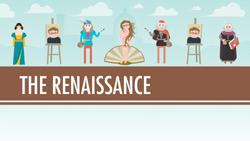| Applying the scientific method to their physical world,
Enlightenment thinkers, or philosophes, reexamined all aspects of life—from
government and justice to religion and women’s rights. They created
a movement that influenced the entire Western world.
Path to the Enlightenment
-
Eighteenth-century intellectuals used the ideas of the Scientific
Revolution to reexamine all aspects of life
The intellectuals of the Enlightenment were especially influenced
by two seventeenth-century Englishmen—Isaac Newton, who discovered the
laws that governed the physical world, and John Locke.
John Locke
In his Essay Concerning Human Understanding, John
Locke argued that every person was born having a tabula rasa, or ‘blank
slate’ of a mind.
Reason and knowledge, he said, come to us through experience.
“Our observation, employed either about external sensible
objects or about the internal operations of our minds perceived and reflected
on by ourselves, is that which supplies our understanding with all the
materials of thinking.”
Isaac Newton
Newton believed that the world, and everything in it
was like a great machine, operating according to Natural Laws
Through systematic investigation, these laws could be
uncovered.
This became the dominant intellectual idea of the time.
REVIEW & DO
NOW
Answer the following questions in your spiral notebooks: |
| What was the argument John Locke was making in his Essay
Concerning Human Understanding? |
According to Locke, how do humans acquire knowledge?
What belief of Newton became the dominant intellectual
idea of the time? |
|
|
Ideas of the Philosophes
-
The philosophes wanted to create a better society.
The intellectuals of the Enlightenment were known as philosophes,
the French word for “philosophers.”
The philosophes were philosophers, writers, economists,
social reformers.
The philosophes believed that just as science, mathematics,
and reason led to our understanding of the Laws of Nature in Newtononian
Physics, science could also lead to our understanding of Human Nature,
and in that way, design a perfect society.
The Role of Philosophy
Montesquieu
Charles-Louis de Secondat was the French Nobleman known
as
the Baron de Montesquieu—
In his study of governments, The Spirit of the Laws
(1948), Montesquieq identified three basic types of governments:
Republics, suitable for small states;
despotism, appropriate for large states;
and monarchies, ideal for moderately-sized states.
Montesquieu describes England's government as having three
branches:
the Executive, the Monarch—
the Legislative, Parliament—
and the Judicial, the Courts of Law.
The government of England functioned through a separation
of powers.
Montesquieu’s most lasting contribution to political thought
was his idea that a government should have a system of checks and balances,
a system of political limits and controls, through separation of
powers.
His ideas were later used in the United States Constitution.
Voltaire
The philosophe François-Marie Arouet, known
simply as Voltaire, was considered to be the greatest figure of
the Enlightenment.
In his Treatise on Toleration (1763), he argued
against religious intolerance, especially in France, saying “All men are
brothers under God.”
Throughout his life, Voltaire championed deism,
a religious philosophy based on reason and natural law.
In the Deists’ view, a mechanic (God) had created the
universe.
The universe was like a clock. God, the clock-maker,
had created it, set it in motion, and allowed it to run without his interference,
according to its own natural laws.
Diderot
Denis Diderot’s most famous contribution to the Enlightenment
was his Encyclopedia, or Classified Dictionary of the Sciences, Arts,
and Trades, a 28-volume collection of knowledge he edited.
Published between 1751 and 1772, Diderot hoped it would
"change the general way of thinking."
The Encyclopedia was a way to spread Enlightenment Ideas.
Diderot even visited with heads of government, such as in his meeting with
Catherine the Great of Russia.
REVIEW & DO
NOW
Answer the following questions in your spiral notebooks: |
Who were the philosophes?
What was their goal?
How did they think this could be done?
What were the three basic types of governments, as identified
by Montesquieu?
What were the three branches of government Montesquieu
described England as having? |
What was Montesquieu's most lasting contribution to political
thought?
What was Voltaire's argument in his 1763 Treatise on
Toleration?
What is Deism?
What work is Denis Diderot most known for?
Describe this work. |
|
|
New Social Sciences
-
The Belief in logic and reason promoted the beginnings of
social sciences.
The Physiocrats
The Physiocrats were a group of French philosophes interested
in identifying the natural laws that governed economics.
They believed that if individuals were free to pursue
their own economic self-interests, all society would benefit. They
believed the state should leave the economy alone.
This doctrine became known as laissez-faire
economics.
The translation of laissez-faire means “to let
(people) do (what they want).”
Adam Smith on Economics
The best statement concerning laissez-faire was
written by Adam Smith.
The Physiocrat and Scottish philosopher Adam Smith
is regarded as the founder of the modern social science of economics.
In his book Wealth of Nations (1776), Smith
argued there were three basic roles of government:
| 1. |
The government should protect society from invasion (the
function of the army). |
| 2. |
The government should defend citizens from injustice
(the function of the police). |
| 3. |
The government should keep up certain public works that
private individuals alone could not afford—but which are necessary for
social interaction and trade. |
Two competing Economic Systems:
|
Mercantilism vs. Laissez-Faire Economics
|
| Mercantilism |
Laissez-Faire Economics |
A nation's wealth is measured by:
-
The amount of gold & silver in its treasury
|
A nation's wealth is measured by:
-
It's annual output of goods & services
|
To increase wealth, government must:
-
encourage exports to bring in gold & silver
-
restrict imports to avoid draining away gold & silver
-
grant monopolies and financial support to local businesses
to give them an advantage over foreign competition
|
To increase wealth, government must:
-
impose no restrictions on trade, allowing it to operate freely
-
provide no support or monopoly advantages for local businesses,
so that competition can freely occur
|
Beccaria on Justice
Social scientists also dealt with the idea of justice,
especially in the legal system.
In the eighteenth century, most European courts used punishment
to deter crime, since most police forces were too weak and ineffective
to capture criminals.
Most punishments were cruel.
However, in his 1764 book On Crimes and Punishments,
the philosophe Cesare Beccaria, argued that the punishment
should not be brutal, and he argued against capital punishment, the death
penalty, because he said it was an ineffective deterrent to crime.
REVIEW & DO
NOW
Answer the following questions in your spiral notebooks: |
| Who were the Physiocrats?
What is the literal (translation) meaning of "laissez-faire?"
What is the doctrine of laissez-faire?
In Wealth of Nations, what did Adam Smith argue
were the three basic roles of government? |
What was the argument Cesare Beccaria made in On Crimes
and Punishments?
What is meant by "capital punishment?"
What was Beccaria's feeling about it, especially in regards
to its deterrent effect? |
|
|
The Spread of Ideas
-
From the upper classes to the middle classes and from salons
to pulpits, the ideas of the Enlightenment spread.
The Social Contract
Jean-Jacques Rousseau
In Discourse on the Origins of the Inequality of Mankind,
Rousseau argued that, by adopting laws and government in order to preserve
their private property, people had made themselves slaves to the government.
In The Social Contract (1762), Rousseau argued
that society should be governed by a social contract—through which
a society agrees to be governed by the general will of the people.
Rousseau believed in
the balance of heart and mind,
the rule of the general will, and
education to foster natural instincts.
Rousseau did not believe in rule by laws and government.
Women's Rights
By the eighteenth century, female thinkers began to express
their ideas concerning the improvement of the lives of women.
Mary Wollstonecraft, English writer
advanced the strongest statement for the rights of women.
A Vindication of the Rights of Women argued women
should have equal rights in education, economics, and political life.
The Growth of Reading
Books had previously been directed at small groups of
educated elite.
After 1780, books were aimed at the new reading public
of the middle classes, which included women and urban artisans.
The Salon
The salon was an elegant drawing room where intellectuals
drank coffee and discussed Enlightenment ideas.
Salons helped spread the ideas of the Enlightenment and
gave some women new power.
Religion in the Enlightenment
John Wesley
The founder of Methodism
Methodism was a religious movement and an evangelical
form of Christianity. They believed in spreading the word of the
Salvation by Jesus Christ through the Grace of God.
Methodists stressed the importance of hard work and spiritual
contentment instead of political equality.
REVIEW & DO
NOW
Answer the following questions in your spiral notebooks: |
| What was the argument Rousseau made in his Discourse
On the Origins of the Inequality of Mankind?
What was the solution for this, as Rousseau argued in
The
Social Contract? |
By the 1780's, who were the new reading public?
What were salons?
Did the salon help elevate the role of women?
Who was John Wesley?
What was a doctrine he taught? |
|
|
|





